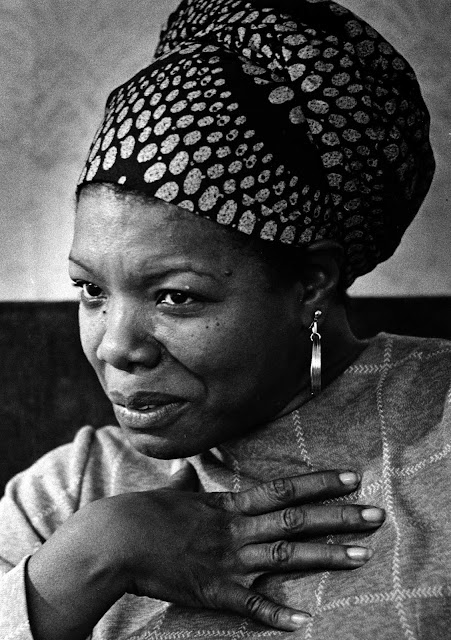Femme and Fierce: Part Two
Welcome to blog post number two in our mini-series, 'Femme and Fierce', which focuses on celebrating inspirational women and their accomplishments - showing the world that women are a force to be reckoned with!
If you missed part one, click here to catch up.
This series is also in collaboration with the lovely Ellie, also known as PerfectlyPutTogether.com. Her part two for this series is on the incredible Chidera Eggerue, also known as 'The Slumflower'.
M A Y A A N G E L O U
To be honest with you all, I was a bit nervous to write this profile of Maya Angelou after researching her incredibly moving and inspiring life story. This woman used her voice during a time that didn't want to hear it, to start national conversations about sexual trauma and violence, civil rights and the restrictions still experienced by African Americans in the 1960s.
"She moved through the world with unshakeable calm, confidence, and a fiery, fierce grace and abounding love.”
-Oprah Winfrey
I decided to write about Maya after reading the first of her autobiographies 'I know why the caged bird sings'. The book details Angelou's life, including her rape at age 7 followed by a series of events that led her to an episode of silence in her early life. It is suggested that her vow of silence was the result of her own fear of her own words, as her attacker was killed after she revealed her story.
Later in her life, she talks about the struggles of being a black writer and poet. As the title of her first autobiography suggests, this struggle encapsulated her whole life story, feeling that her words would not be heard because of the colour of her skin.
Angelou's experience with racism and her shifting perspective from fearing the impact of her voice to realizing that the stories she had to share with the world had the power to inspire. When I was reading her book, I couldn't help but have an introspective approach to appreciating her work. There is something about her eloquent ability to demonstrate strength from a place of vulnerability and pain. Although the experiences she shares in 'I know why the caged bird sings' are so undeniably unique to her, there is something to be said about how I was able to relate to her experience as a young woman. For many, Angelou provides poems and stories that resonate with the experiences of African-Americans, people in poverty and those faced with an ageist society.
"The caged bird sings
with a fearful trill
of things unknown
but longed for still
and his tune is heard
on the distant hill
for the caged bird
sings of freedom."
- Maya Angelou
Angelou's poetry has also been notably praised for the beautiful language and imagery created about topics such as civil rights, the vivacity of women and the human spirit, Black beauty, love, and social justice. Famously, Angelou was invited by President Bill Clinton to read at his inauguration, making her the second poet in history to read at such an event. The poem she wrote and read urged America to remember the civil rights movement of Dr. Martin Luther King. 'On the Pulse of Morning' called the new American Administration and people across the world to push for progress.
"The horizon leans forward,
Offering you a space to place new steps of change
Here, on the pulse of this fine day"
-Maya Angelou
After researching and researching her poetry, I wondered how the delivery of her work was intended, as the poetry itself has always been talked of highly due to its powerful messages and personal narrative, rather than the literary devices used. If you watch her reading one of her famous poems, 'Still I Rise', her words really come alive with a fiery elegance.
It's hard not to be inspired.
Her work offers the kind of depth and responsibility that I think is largely missing from modern day society. Angelou passed away at age 86 in 2014 and although she inspired and shed light on worldwide issues of racial inequality, sexism, slavery and more, few writers and poets can match the passion and dexterity that she imparted on the world.
I think it's important that we learn from Maya Angelou, the value of voicing your stories, however, best you can. Whether that be through writing, painting, photography, or any other creative outlet, there is a sense of unity that can be shared in a society apparently divided at the moment. Angelou advocated for the understanding and accepting of everyone, regardless of race, sexuality or gender because, at the end of the day, we are all humans. As Angelou so aptly puts it:
"Here, on the pulse of this new day
You may have the grace to look up and out
And into your sister's eyes, and into
Your brother's face, your country
And say simply
Very simply
With hope --
Good morning."
I think it's important that we learn from Maya Angelou, the value of voicing your stories, however, best you can. Whether that be through writing, painting, photography, or any other creative outlet, there is a sense of unity that can be shared in a society apparently divided at the moment. Angelou advocated for the understanding and accepting of everyone, regardless of race, sexuality or gender because, at the end of the day, we are all humans. As Angelou so aptly puts it:
"Here, on the pulse of this new day
You may have the grace to look up and out
And into your sister's eyes, and into
Your brother's face, your country
And say simply
Very simply
With hope --
Good morning."

Comments
Post a Comment